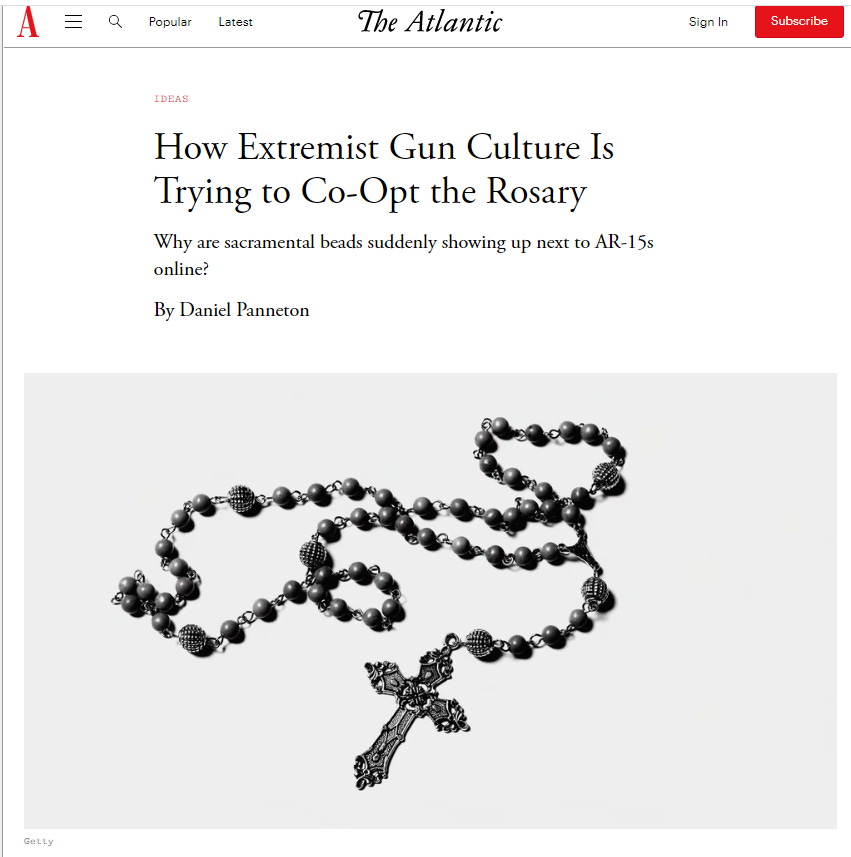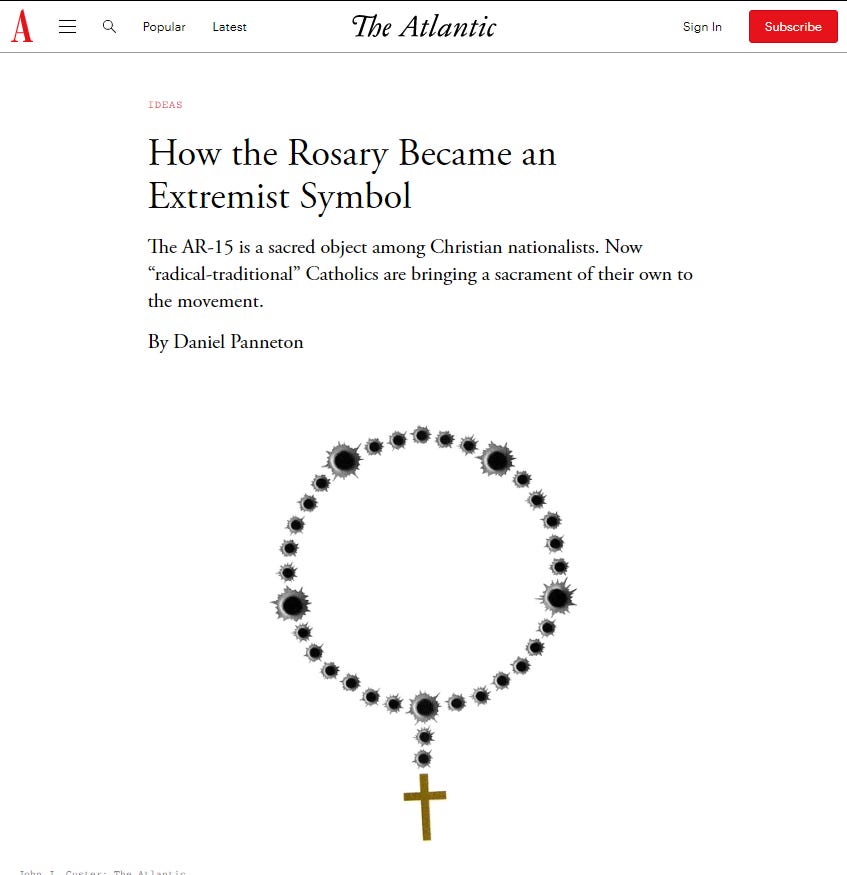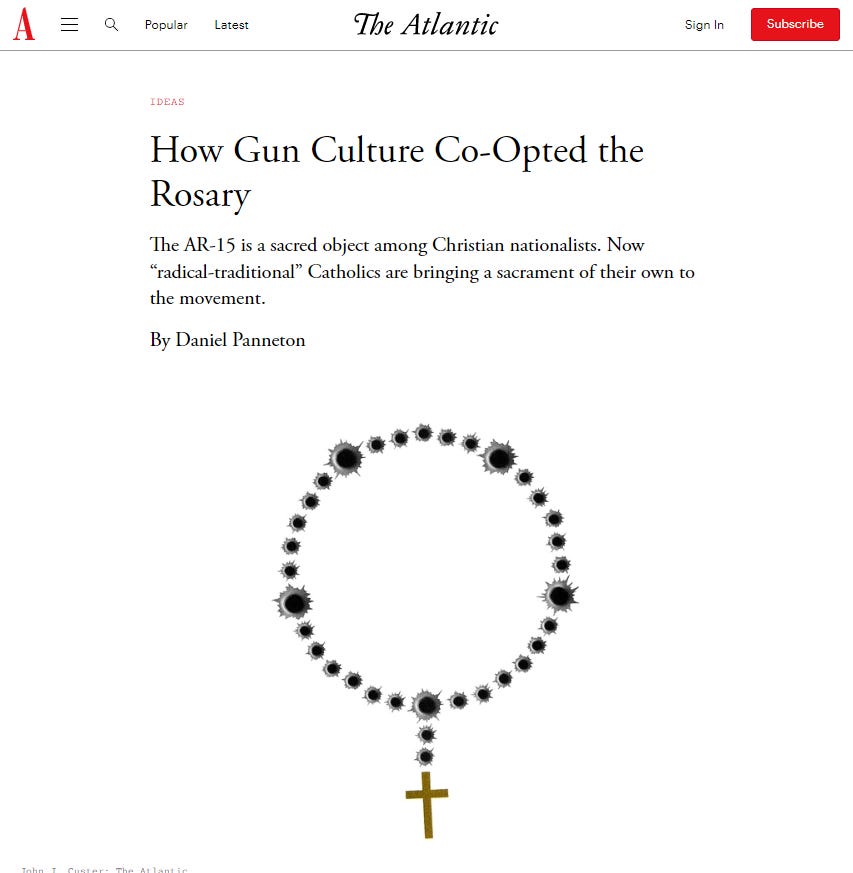The Propaganda Apparatus is Seeking an Angle to Make "Christian Nationalism" Stick
The Atlantic ran an opinion piece this week by Canadian historian, Daniel Panneton - under their cringe-inducing, market tested, euphemistically named Ideas section - originally entitled, How the Rosary Became an Extremist Symbol. By mid-day, this idea had received enough online backlash that the editors made multiple changes to its headline, subheading and lead graphic. On the surface, the original configuration was a no-holds-barred attack on a very theologically conservative subset of Roman Catholics, who call themselves “radical-traditional”. A deeper examination of the piece reveals that, like most mainstream articles on “Christian Nationalism”, it was a thinly veiled attack on the traditional, Christian ethic itself.

Full disclosure: as someone who generally falls into the “Reformed Protestant” camp of Christian doctrine and theology, I, like Panneton, find much of what “rad-trad” Catholics push to be an unsound representation of the gospel - and an inaccurate portrayal of what is important to Father, Son and Holy Spirit. For example, many of that subgroup place prime importance on Latin Mass and Latin prayers, when the primary language of the apostolic church was Greek. There is no Scriptural basis for considering any human language to be more holy - or unholy - than any other language. In fact, much of Jesus Christ’s ministry (and Old Testament prophesy) was directed towards getting people to focus on their inward perceptions above their outward performance (Matthew 15:10-20, Hosea 6:6).
To be fair to the rad-trads, these type of Sola Scriptura disagreements1 strike at the heart of what caused the church to split in the sixteenth century; they are simply leaning hard into what their side traditionally teaches. Though we strongly disagree on key subjects, like soteriology (how one becomes rectified to the Creator), we have far more things in common with each other than either of us have in common with the secular world, especially those who are belligerent in their attempts to make the church more secular. Though Panneton’s article explicitly targets a Catholic subgroup, what he takes umbrage with, through hyperbolic language, are theological principles that mainstream, devout Roman Catholics, Eastern Orthodox and Protestants agree on:
A traditional, Christian sexual ethic, including the belief that anything outside of heterosexual monogamy should not be promoted by the church.
A worldview that does not vilify masculinity as inherently “toxic”, but believes a man can be both overtly masculine and gentle (and that this is in alignment with God’s will).
That evil objectively exists, that Christians are called to live lives in opposition to that evil, and that prayer is a key, effectual component of that opposition.
It is this last point that strikes at the the heart of the relativist worldview Panneton promotes, which stands dichotomous to his opposition, and which is the philosophical origin of the counter-view to the other two points2. Panneton demonstrates this through subjective statements that he attempts to pass off as objective truths. Here are a few:
Militia culture, a fetishism of Western civilization, and masculinist anxieties have become mainstays of the far right in the U.S.—and rad-trad Catholics have now taken up residence in this company.
The militarism also glorifies a warrior mentality and notions of manliness and male strength. This conflation of the masculine and the military is rooted in wider anxieties about Catholic manhood—the idea that it is in crisis has some currency among senior Church figures and lay organizations.
The rosary-as-weapon also gives rad-trad Catholic men both a distinctive signifier within Christian nationalism and a sort of membership pass to the movement.3
Here we have the ubiquitous false equivalency and self-contradiction of “Christian Nationalist” scare pieces. Holding to a biblical view of masculinity, as demonstrated by God the Father, who is both loving and forgiving, yet reproachful when warranted, is warped so it can be equivocated to something more akin to a nationalist, Nietzschean superman. The concept of biblical masculinity under attack is presented as an unrealistic, extremist position, when the very same article decries those resisting “LBGTQ acceptance” within the church4 - a euphemism for compromising on the biblical sexual ethic, which stands against overt effeminization, such as pastors giving sermons to children while in drag. The Apostle Paul’s obvious spiritual analogy of the armor of God (Ephesians 6:10-20), which includes a sword of the Spirit, is what “rosary-as-weapon” means to rad-trads, but Panneton, throughout the piece, takes the analogy to the most uncharitable conclusions, in service of his hypothesis of violent extremism. One can completely disagree with the positions of rad-trads, or conservative Christians in general, but that Panneton is generalizing and propagandizing for his preferred ends is undeniable.
As often as those outside of Christianity attempt to paint it with a reductionist brush, it is not a religion of cut and dry answers for everything. Believers are called to not resist those who would do evil to us (Matthew 5:38-41), but we are also told to actively prevent evil from being done to others (Proverbs 24:10-12). Current, secular culture tells us that not only should we allow doctors to mutilate the bodies of children, based on the oft-changing feelings within their still forming brains, but that Christian parents should have no say in the matter if we disagree5. California may soon give sanctuary to runaway teenagers with parents who do not consent to these irreversible operations, like elective hysterectomies and mastectomies, sealing of the vaginal cavity, and mutilation of the penis to form a fake vagina. Where does that land between "evil to me" and "evil to others"? Are we to allow other parents to send their children down this path (fully knowing some children are coerced by an attention-seeking parent6), while fighting tooth and nail for our own children, or should we work to make sure this happens to no child? These are not easy questions to answer in a pluralistic society (though I, with some understanding of the joint philosophical underpinnings of eugenics and transhumanism, land on the latter). Most theologically conservative Christians, like everyone else, maintain lines in the sand while still overwhelmingly accepting societal pluralism.
Ironically, it is anti-conservative-Christian activists who deny pluralism, and who, through a massive act of projection, seek to paint those they wish to eradicate as the dangerous ideologues. What we can gather from articles like Panneton’s is that the only church that should ultimately be allowed to exist is one that looks more like the Castro in June than Vatican City in December; the only good Christian is one who quietly acquiesces to every encroachment, leaving no opposition to turning his children against him and against their Creator. This is not a hidden sentiment - Panneton opens his piece by framing rad-trads’ traditionally-minded distaste for the politics of Pope Francis, which stand in direct opposition to his recent predecessors (most notably John Paul II), as “conspiratorial politics”. The message is clear: the only orthodoxy that should be allowed is full adherence to existentialist ideals - the church and its values must get out of the way of progress™.
This is not to say that there are no people who fit Panneton’s extremist bill - such as Colorado Congresswoman, Lauren Boebert, who recently told a church that Jesus did not have enough AR-15s to keep the Romans from killing Him7, something that was roundly rejected as borderline-heresy by conservative Christian leaders and pundits - but those pushing the “Christian Nationalist” line seek to cram as many of their political adversaries into this taxonomy as possible, for the political advantage of making their demands for government-enforced orthodoxy more palatable to the general public. There is a chasm of difference between a professing Christian who makes an idol of politics (or guns, Western Civilization, etc.) and one who seeks to create a "Church of America" as the final authority. That those who decry "Christian Nationalism" fail to distinguish the two is by design.
Every totalitarian movement that rose to dominance began with literature painting a minority group as having far more power, and far more authoritarian aims, than was true. The Christian Nationalist pejorative is an attempt to Kulakize a moderately influential minority of devout Christians who refuse to condone a secular worldview of self-actualization above everything, and everyone, else, by lumping them in with a minuscule, theonomist fringe that has more influence on Twitter and 4chan than in the church at-large. The propaganda apparatus is desperately seeking to vilify its opposition through this rubric, because their own policies increasingly fly in the face of reason, and the average, non-religious, middle-class American rejects them when they are plainly, and honestly, presented. If they cannot be convinced they have a common enemy alongside progressive secularists, they will be left to discover they have compatriots in mainstream, conservative Christians.
Protestants who hold to the tenets of the Reformation believe that Scripture is the final authority on all things, and that no man can add to or modify what God commands through it. While the church has authority over the believer, leaders must defer to Scripture, the only infallible authority. Things that are not explicitly dictated in the Bible generally fall in the realm of an individual’s liberty of conscience. Roman Catholics and Eastern Orthodox believe that the church has been given authority on par with Scripture and, in practice, priority over it. Protestants would argue that they command things in contradiction to Scritpure, such as a view of Mary that Protestants see as demi-deification and asking long-dead humans and angels to intercede on their behalf, when the Bible explicitly states that Christ directly communes with believers and intercedes for them, based on that communion, without the need of extra convincing by other entities (Hebrews 7:25, John 15:7).
Panneton qualifies this statement by referencing Taking America Back for God: Christian Nationalism in the United States. It, like most of the “Christian Nationalist” genre, spends its opening chapters detailing the results of a worldview study of Christians, in an attempt to appear scientific and objective, then spends the rest of the book shoehorning those results into the authors’ preconception that anyone who answers yes to the question, “Is America a Christian nation?” is probably a theonomist.
“The theologian and historian Massimo Faggioli has described a network of conservative Catholic bloggers and commentary organizations as a ‘Catholic cyber-militia’ that actively campaigns against LGBTQ acceptance in the Church.”
The Atlantic - How the Rosary Became an Extremist Symbol - https://www.theatlantic.com/ideas/archive/2022/08/radical-traditionalist-catholic-christian-rosary-weapon/671122/




